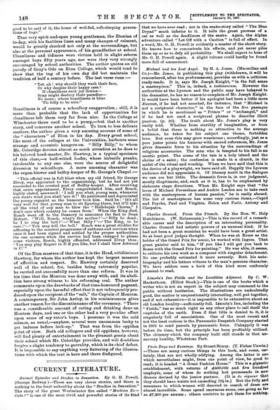Michael and his Lost Angel. By H. A. Jones. (Macmillan
and Co.)—Mr. Jones, in publishing this play (withdrawn, it will be remembered, after ten performances), provides us with a criticism ready-made. It is, says Mr. Joseph Knight, "in the full sense a masterpiece." This is, indeed, a testimonium. However the authorities at the Lyceum and the public may have behaved to the dramatist, he has no reason to complain of Mr. Joseph Knight. It would have been better if his apologist had been a little more discreet, if he had not asserted, for instance, that "Michael is not a scriptural character," in the face of the five passages in which he is mentioned as " Prince " or "archangel," and if he had not used a scriptural phrase to describe illicit passion. (p. 20). The truth about Mr. Jones's play is very easily told. Whether from sterility of imagination, or from a belief that there is nothing so attractive to the average audience, he takes for his subject one theme, forbidden love. But even this may grow wearisome ; accordingly, just as a poor jester points his humour with sacred references, Mr. Jones gives dramatic force to his situation by the surroundings of religious accessories. The man who is tempted to his fall is an ascetic priest. The scene of the tale is a holy island and the shrine of a saint; the confession is made in a church, in the midst of the ritual and worship. When we have said that this is the device of a playwright, we have said all. Happily the Lyceum audience did not appreciate it. Of literary merit in the dialogue we can see but little. The dramatic force is, in our judgment, mostly illegitimate, and, such as it is, has to be emphasised by elaborate stage directions. When Mr. Knight says that "the loves of Michael Feversham and Audrie Lesden are to take rank with the masterpieces of human passion," he is really absurd. The list of masterpieces has some very curious items,—Cupid and Psyche, Paul and Virginia, Helen and Paris, Antony and Cleopatra.


















































 Previous page
Previous page